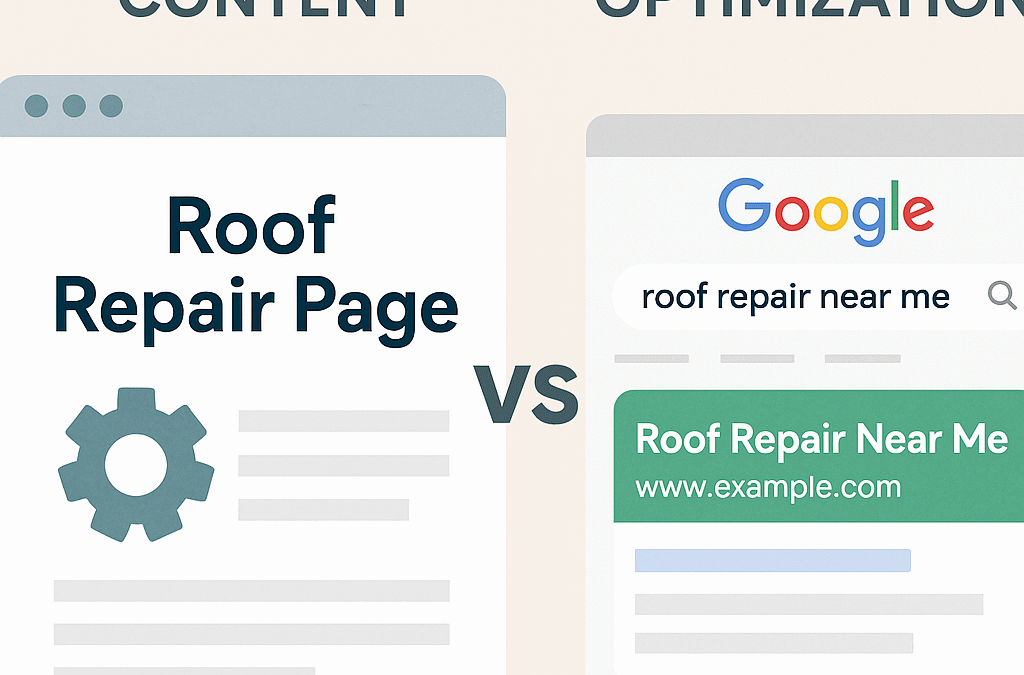Many roofing contractors believe that writing a page or publishing a blog post is the same as doing SEO. The truth is that content alone will not bring in new customers. SEO is the strategy that ensures your content gets found by people searching for roof repairs, replacements, and inspections in your service area. The real goal is not to add more pages. The goal is to attract qualified homeowners who need your services right now.
What Homeowners Actually Search For
When people are looking for roofing services, they use short and direct queries. These patterns repeat across every market. If your pages do not match these queries, they will struggle to rank or bring in leads.
- Service + Near Me — roof repair near me, roof replacement near me
- Service + City — roofing contractor Nashville, roof replacement Dallas
- Emergency or Specific Need — emergency roof repair, hail damage roof repair
- Service + Cost/Estimate — roof replacement cost Chicago, roof inspection estimate
Key point: A blog post titled “Our Roofing Services” may not rank for what customers are actually typing into Google. SEO ensures your content targets these high-intent searches.
How to Check if Your Roofing Pages Work
Step 1. Look at Google Search Results
- Search Google for:
- roof repair near me
- roof replacement [your city]
- emergency roof repair [your city]
- Notice what appears:
- Are local competitors ranking ahead of you?
- Do directory sites like HomeAdvisor or Angi dominate the page?
- Is the Google Business Profile map pack pushing organic results down?
Step 2. Use Google Search Console to See Queries
- Log into Google Search Console (GSC).
- Go to Performance → Search results.
- Add a Page filter for your roof repair or roof replacement page.
- Check the Queries tab to see what searches bring impressions and clicks.
Example: You may find impressions for “roof inspection checklist” (informational) but not enough for “roof repair near me” (transactional). That means your content needs to be adjusted to target buying intent instead of research intent.
Step 3. Compare Against Competitors
- Review the pages that rank for “roof repair [city].”
- Do they use clear headings such as “Roof Repair Services in [City]”?
- Are they showing photos of completed projects, testimonials, or financing options?
- Do they have strong calls to action like “Call Now for a Free Estimate”?
Using UTMs in Google Business Profile
Your Google Business Profile (GBP) is often the top source of local roofing leads. The website link usually points to the homepage, not a specific service page. Without tracking, GBP traffic blends into “Organic” or “Direct” traffic, making it hard to measure.
How to Set Up UTM Tracking
Edit the website link in your GBP and use a tagged homepage link:
https://www.yourroofingcompany.com/?utm_source=google&utm_medium=organic&utm_campaign=GBPHow to Analyze in Search Console
- Go to Performance → Search results.
- Add a Page filter containing
utm_campaign=GBP. - Open the Queries tab to see which searches drive GBP clicks.
Insight: You may find that most GBP clicks come from “roof repair near me” or “roofing company [city].” This shows how critical GBP is for local SEO. People often land on your homepage first, then navigate to service pages. Tracking lets you see that path clearly.
SEO Goes Beyond Content
Simply writing a page about roofing services will not rank on its own. SEO ensures it is discoverable and competitive by:
- Targeting service + city and “near me” queries
- Optimizing titles, headings, and meta descriptions
- Adding project photos, testimonials, and calls to action
- Improving site speed and mobile performance
- Tracking traffic from GBP with UTM parameters
Bottom Line
Writing content is an activity. SEO is the strategy that makes it effective. Roofing companies should focus on ranking for the exact queries homeowners use when they need roof repairs, replacements, or inspections. Measure success not by the number of pages you publish but by the qualified traffic and leads those pages bring in.


Recent Comments